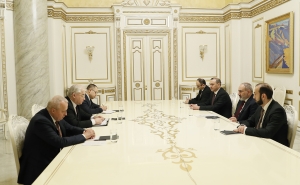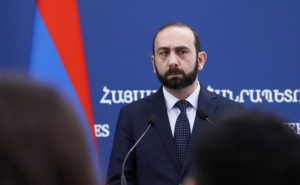Anti-Russian Sanctions: Trump Faces Hard Choice

On July 25, 2017 the House of Representatives of the US Congress approved the bill named “Countering America's Adversaries through Sanctions Act” which aims at “countering aggression by the Governments of Iran, the Russian Federation, and North Korea, and for other purposes.” The bill was approved by the House of the Representatives by 419 for and 3 against votes. Only three libertarian-leaning Republicans – Justin Amash of Michigan, Tom Massie of Kentucky and Jimmy Duncan of Tennessee – voted against the bill in the House, the Guardian reports.
To note the bill aims at turning the already existing sanctions against Russian individuals and businesses imposed after the passing of Crimea to Russia, into a law. In addition the bill presupposes new sanctions against Russia because of its assumed interference in the US presidential elections in 2016. Those new sanctions target such key Russian industries as railways, shipping, metals and mining, as well as Russian oil industry.
At present the sanctions against Russia are just in the form of the executive order, which means that the US president may override them, whenever he wishes. However, once this bill is confirmed by the US Senate and the president, the sanctions will turn into a law, which means the president himself will not be able to ease the sanctions, if he did not have the approval of the US congress for that, CNN reports.
To remind, the current bill is a kind of continuation of the previous bill approved by the US Senate. However, as compared to the previous one, the current bill in addition to the proposed sanctions against Iran and Russia, also introduces sanctions against North Korea. Although the previous bill was approved by the Senate by 98-2 votes, it caused a lot of discussion in the House of Representatives and consequently underwent certain changes. Now, the current bill needs to again undergo voting in the US Senate than be signed by the US President. Although the US president can veto the bill, the US Congress can in its turn use its veto to override the veto of the president.
So what is the position of the White House on the current bill? At first information was disseminated that the White House consults with the republican congressmen in the House of Representatives to ease the sanctions against Russia. However, the other day, Sarah Huckabee Sanders, the new White House press secretary, on the occasion noted: “While the President supports tough sanctions on North Korea, Iran and Russia, the White House is reviewing the House legislation and awaits a final legislative package for the president’s desk.”
In response Russian Deputy Foreign Minister Sergey Ryabkov warned that "the authors and sponsors of this legislation are taking a serious step towards the destruction of prospects for normalizing relations with Russia," TASS reports.
The European Union, in its turn, also expressed concern, saying it would act "within days" if its concerns over the supply of Russian energy to Europe were not addressed, CNN reports.
Experts still say that the possibility of Trump’s signing the bill is high as long as it refers not only to the sanctions against Russia, but also Iran and North Korea. On the other hand, however, Trump is to make hard choice, in terms of the existing accusations against Trump of being pro-Russian, Trump’s administration aspirations to improve relations with Russia and the opposition of the Europe against the anti-Russian sanctions.
Other materials on this subject
- Alexander Novak: Russia reached agreement with Azerbaijan on increase of natural gas deliveries "There is an agreement with Azerbaijan to increase our supplies because they still have a gas deficit," he said.
- UN Secretary-General Condemns Attack Near Russian Embassy in Kabul The secretary-general conveys his condolences to the families of the deceased and wishes a speedy recovery to the injured.
- Russia and Iran To Introduce a Visa-free Regime The mode will be valid for groups of 5 to 50 people.
- Russia MFA: Azerbaijan-EU Natural Gas Agreement Does not Contradict Baku Allied Cooperation with Moscow Each and every country has the right to independently decide how and with whom to develop its relations, including in the oil and natural gas sector.
- The United States Announced Its Readiness For a Dialogue With Russia on the Future of Arms Control We are ready to resume dialogue with Russia to shape the future of modern arms control if Russia is ready to act in good faith.
Other materials on this subject
- Turkey is sending Cold War-era cluster bombs to Ukraine – FP The weapons are designed to destroy tanks by bursting into smaller submunitions, which can linger on the battlefield for years if they do not immediately explode. Each round scatters about 88 bomblets.
- Los Angeles mayor and city council president address US president on Lachin corridor issue Thank you, Mayor Bass, for joining me in communicating to President Biden the urgent need for U.S. leadership to lift the blockade and bring humanitarian relief to the people of Artsakh.
- US Committed to Helping Armenia and Azerbaijan Resolve Issues Peacefully: Blinken Spoke With Pashinyan The Secretary reiterated our commitment to helping Armenia and Azerbaijan resolve issues peacefully.
- Iran to Submit Final Conclusion Over Nuclear Deal Revival by Midnight In comments on Monday, Amirabdollahian said Iran is going to send its final conclusion about the JCPOA talks to the European coordinator in written form at midnight.
- Erdogan, Biden Might Meet in September- Media Turkey plans to buy 40 F-16 fighter jets from the US and upgrade another eighty. US President Joe Biden stated that he expects to receive the approval of the [US] Congress to sell F-16 fighter jets to...
-
 17:08
17:08The regular session of the Anti-corruption Policy Council takes place in Jermuk
-
 15:05
15:05The Prime Minister sends congratulatory messages to the supreme leader of Iran and the President of Iran
-
 11:11
11:11Armenia sends earthquake aid to Turkey
-
 10:43
10:43Commemoration of the Pontiff St. Sahak Partev
-
 09:16
09:16Some roads are closed and difficult to pass in Armenia
-
 19:55
19:55Phone conversation of the Foreign Minister of Armenia with the U.S. Assistant Secretary of State for European and Eurasian Affairs
-
 18:30
18:30Prime Minister Pashinyan and President Khachaturyan meet
-
 18:20
18:20Ararat Mirzoyan with Co-Chairman of the OSCE Minsk Group of France Brice Roquefeuil
-
 17:01
17:01Humans could land on Mars within 10 years, Musk predicts
-
 16:45
16:45France, US urge 'immediate' end to Nagorno Karabakh blockade
-
 16:01
16:01Blockaded Nagorno Karabakh launches fundraiser to support quake-hit Syria
-
 15:59
15:59Earthquake death toll in Turkey rises to 18,342
-
 15:43
15:43Ararat Mirzoyan Held a Telephone Conversation with Sergey Lavrov
-
 15:06
15:06French president rules out fighter jet supplies to Ukraine in near future
-
 14:47
14:475 Day Weather Forecast in Armenia
-
 14:44
14:44President Vahagn Khachaturyan wrote a note in the book of condolences opened in the Embassy of Syria in Armenia
-
 14:20
14:20Azerbaijan’s provocations impede establishment of peace and stability – Armenian FM tells Russian Co-Chair of OSCE MG
-
 12:57
12:57France representation to OSCE: Paris calls on Azerbaijan to restore freedom of movement through Lachin corridor
-
 11:40
11:40Command of Kosovo forces highly appreciated preparation of Armenian peacekeepers
-
 10:16
10:16The United States withdrew from sanctions against Syria for six months the provision of assistance after the earthquake
day
week
month
Humidity: %
Wind: km/h









